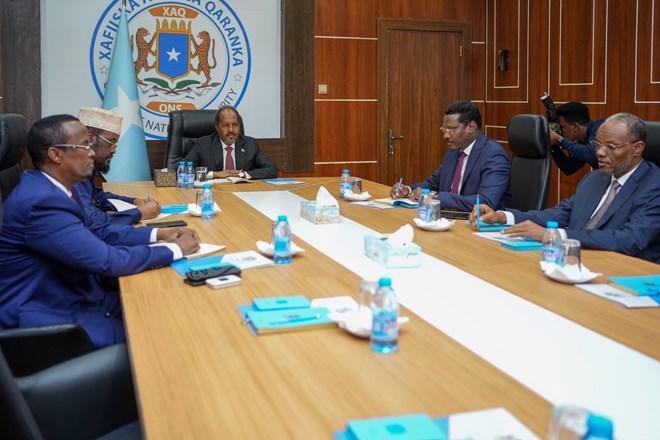
Sunday May 28, 2023

Mogadishu (HOL) - In a landmark development, Somalia's national and regional leaders concluded a four-day summit in Mogadishu on Saturday, charting a new political course for the country. Presided over by President Hassan Sheikh Mohamud, the National Consultation meeting was attended by leaders from across the regional spectrum, along with Prime Minister Hamza Barre and Mogadishu's Mayor Sheikh Hussein Jim'ale Madale.
In a historic move toward democratization, the summit saw a unanimous agreement to institute a one-person, one-vote electoral model to be implemented starting next year. According to a communique issued early Sunday, elections under this model will be held every five years within a single constituency following a proportional representation closed-list electoral system.
However, this shift in electoral policy has not been without criticism. Mohamed Mubarak, a political and security analyst, and founder of the anti-corruption NGO Marqaati, has condemned the single constituency model as a mechanism for disenfranchising Puntland and Somaliland while facilitating the election of "fake representatives" in the south.
The embrace of the one-person, one-vote model signifies a pivotal moment for Somalia as the nation departs from its traditional clan-based, indirect election system. The transition towards universal suffrage holds the promise of enhancing political stability and legitimacy by granting the entire population the opportunity to participate in the electoral process.
The Somali leaders also endorsed a significant restructuring of the nation's political architecture, abolishing the Prime Minister's role in favour of a Presidential system which would enable citizens to directly elect the President and Vice President on a singular ticket. The current Presidential term concludes in May 2026. The communique did not address what happens when the current president's mandate ends.
The move toward a stronger, more centralized executive authority could have implications for the balance of power between different branches of the government. Depending on how the system is implemented, it could either enhance efficiency in decision-making or risk consolidating too much power in a single office.
The new political landscape will see only two parties vying for the public's vote. A synchronized election timetable for regional elections was also agreed upon, with the first nationwide local council elections, including those in Banadir (Mogadishu), slated for June 30, 2024.
The decision to limit the number of political parties to two could simplify the political landscape and potentially reduce fragmentation. However, it may also constrain political plurality and competition, further entrenching the political class.
Mursal M. Khaliif, a member of the Federal Parliament, branded these constitutional changes as "an affront to Somalia's provisional constitution and the supremacy of our national laws." He added that these changes are an "unconstitutional term extension for the Federal Member States and the Federal Government."
Regional Parliamentary, Presidential, and Vice Presidential elections have been scheduled for November 30, 2024. Agreements regarding the allocation of seats for women and Somaliland are underway, with specific timelines yet to be declared.
The reformed Lower House of Parliament will comprise 275 seats, up for grabs in a dual-party contest. Similarly, local council seats will be contested among political organizations, with the two garnering the most votes set to become the country's national political parties.
Additionally, a 15-member election committee will be set up as part of the agreement, with representation from the federal government, the regional governments, and the Banadir region. The committee will bear the responsibility of securing the elections.
Notably absent was the President of the Puntland regional state, marking his second consecutive no-show following the previous meeting in Baidoa last March. Puntland has declared itself an "independent government" since January, accusing Mogadishu of intending to reinstate centralized federal governance.
Deni's absence suggests that there may still be significant regional differences and power struggles, which, along with the dissenting voices of critics, pose challenges to successfully implementing the new electoral model.